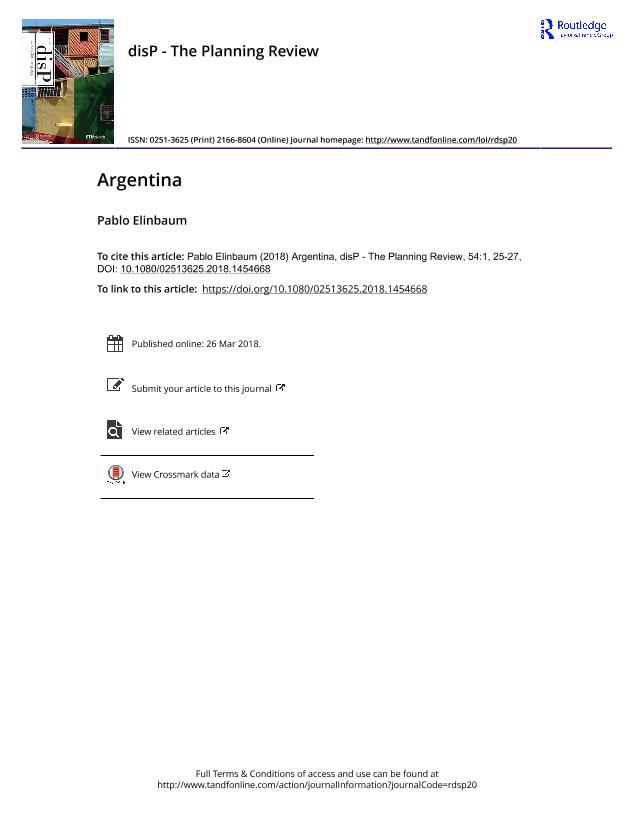Mostrar el registro sencillo del ítem
dc.contributor.author
Elinbaum, Pablo

dc.date.available
2019-12-09T20:13:55Z
dc.date.issued
2018-01
dc.identifier.citation
Elinbaum, Pablo; Argentina; Routledge; disP - The Planning Review; 54; 1; 1-2018; 25-27
dc.identifier.issn
0251-3625
dc.identifier.uri
http://hdl.handle.net/11336/91785
dc.description.abstract
The objective of this article aims to inform the current status of the urban planning system in Argentina. Through a case study, six key issues have been analysed: (1) present status of planning, (2) discourses about planning, (3) theory and practice, (4) social, economic and spatial disparities, (5) planning education, and (6) planning knowledge exchange. The results show that the uniqueness of the Argentine planning system lies in the lack of a legal framework that integrates territorial planning and urbanism, and in the relative federal autonomy that prevented the provinces and municipalities to have their own urban legislation, promoting the rescaling of national government interventions. Among the issues that dominate planning discourses, on the one hand, it is worth mentioning the debates in the field of architects that dominate professional practice and the generic issues established by international organizations that finance most of the urban plans such as the World Bank or the IDB. They pushed notions such as "sustainability", "governance" or "intelligent growth" into State institutional frameworks. On the other hand, the topics that are discussed in the academy arise from basic research in the diffused field of urban studies. The most developed are: global dynamics of urbanization, management of public policies and housing and cultural history. The influence of social sciences has shunned the meagre production of knowledge from planning experiences, explaining, in part, the current split between theory and practice. This separation is also found in urban planning teaching institutions that remain confined within the architecture career (as a dominant field), while postgraduate courses are based on exported contents and totally deregulated scope. Finally, it is worth mentioning that the transfer of technical knowledge between Argentina and the rest of the Latin American countries is very weak. Although the proliferation of information about "best practices", especially from Brazil and Colombia, urban planning models are rarely considered from a critical evaluation of their performance in the native context.
dc.format
application/pdf
dc.language.iso
eng
dc.publisher
Routledge

dc.rights
info:eu-repo/semantics/openAccess
dc.rights.uri
https://creativecommons.org/licenses/by-nc-sa/2.5/ar/
dc.subject
URBAN PLANNING SYSTEMS
dc.subject
GLOBAL SOUTH
dc.subject
CASE STUDY RESEARCH
dc.subject
COMPARATIVE RESEARCH
dc.subject.classification
Estudios Urbanos

dc.subject.classification
Geografía Económica y Social

dc.subject.classification
CIENCIAS SOCIALES

dc.title
Argentina
dc.type
info:eu-repo/semantics/article
dc.type
info:ar-repo/semantics/artículo
dc.type
info:eu-repo/semantics/publishedVersion
dc.date.updated
2019-10-16T15:10:16Z
dc.identifier.eissn
2166-8604
dc.journal.volume
54
dc.journal.number
1
dc.journal.pagination
25-27
dc.journal.pais
Suiza

dc.journal.ciudad
Zürich
dc.description.fil
Fil: Elinbaum, Pablo. Consejo Nacional de Investigaciones Científicas y Técnicas. Oficina de Coordinación Administrativa Saavedra 15. Centro de Estudios Urbanos y Regionales; Argentina
dc.journal.title
disP - The Planning Review
dc.relation.alternativeid
info:eu-repo/semantics/altIdentifier/doi/https://doi.org/10.1080/02513625.2018.1454668
dc.relation.alternativeid
info:eu-repo/semantics/altIdentifier/url/https://www.tandfonline.com/doi/abs/10.1080/02513625.2018.1454668
Archivos asociados
